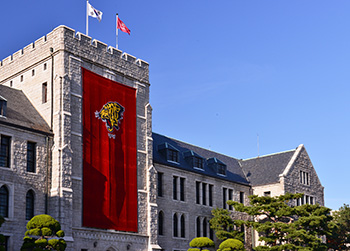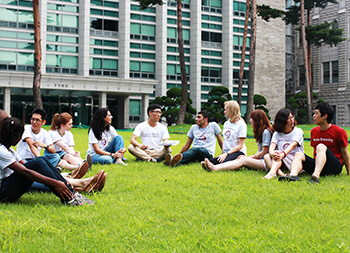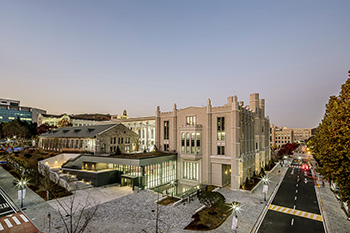Korea University

Korea University, founded in 1905, is widely acknowledged as one of the country’s oldest, largest and top-ranked universities in Korea.
Its reputation for quality is based on excellence in teaching, research and service to Korean society.
Eminent faculty, outstanding students and internationally recognized research programs all contribute to Korea University’s academic fame.

As a major comprehensive university, KU offers a rich variety of courses in liberal arts and sciences as well as in all professional fields, including law, medicine and business administration.
KU campus covers over 182 acres and it's home to more than 36,000 students from all over the nation and the world.
With its stately stone architecture sprawling lawns, seasonal trees and natural flora, KU is known to be one of the most beautiful campuses in Korea.
The students of KU represent Korea’s dream as they are among the nation’s brightest and most ambitious.

KU is nationally recognized for its commitment to teaching and academic excellence.
The university’s academic breadth is extensive with its 81 departments in 19 colleges and divisions, and 19 graduate schools and it has over 1,500 full-time faculty members with over 95% of them holding Ph.D. or equivalent qualification in their field.
KU has particularly strong Humanities and Asian Studies Departments along with the recently established Graduate School of International Studies (GSIS).
KU is also renowned for its professional schools of Law, Medicine and Business Administration.

In research, KU is an internationally recognized leader with over 100 research centers, including the East Asiatic Research Centre and the Korean Cultural Research Centre.
Furthermore, Korea University Business School (KUBS) is the only and the first business school in the country to have acquired both European Quality Improvement System (EQUIS) accreditation, in combination with the accreditation granted by the Association to Advance Collegiate Schools of Business (AACSB).
Unlike many universities in Korea, KU prides itself not only in being a progressive and globally conscious institution but one that plays a role in preserving and developing Korea’s unique culture.